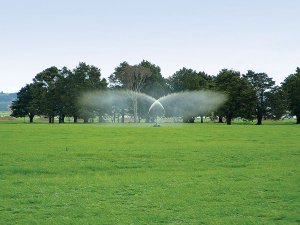Otago Regional Council to launch winter flyovers
Otago Regional Council is set to begin its annual winter farm flyovers in the next three weeks.
 Any effluent applied to saturated soils is likely to pond and run off or leach through the soil or into tile drains, rather than being absorbed by the plants.
Any effluent applied to saturated soils is likely to pond and run off or leach through the soil or into tile drains, rather than being absorbed by the plants.
Applying effluent to saturated soils is prohibited, and if a farmer is found to be in breach of this rule, they could face enforcement action.
When the soil is saturated, the pores within it (gaps between soil particles) are filled with water.
Any effluent applied during these conditions is likely to pond and run off or leach through the soil or into tile drains, rather than being absorbed and taken up by the plants.
So, how do you know if the soil is saturated? A simple squelch test can tell you, according to Otago Regional Council.
Ponding occurs when the effluent, solids, and liquids that are applied to land stay on the surface as a pond or puddle rather than being rapidly absorbed into the soil.
Ponding of effluent results in runoff and leaching into waterways and groundwater aquifers and is a prohibited activity in the Otago Water Plan.
What causes ponding?
Once the soil is squelchy under foot or at saturation point, it’s too late to avoid ponding and runoff. Irrigate only when there is enough soil water deficit to absorb the applied effluent.
If ponding or runoff occurs when there is a soil water deficit, it means you are applying too much effluent or applying it too quickly.
Applying solids, sludge, muck and slurry to paddocks must be treated the same as liquid effluent.
The same goes for effluent being applied with irrigation water, no matter what the mix is.
Good practices include timing: Do not apply sludge, muck and slurry solids to soils that are at or near saturation. Apply it to land when the grass or crops are able to take it up quickly and use it when soil moisture levels are low, and soil temperatures are warmer. Keep the application well away (at least 50 metres) from waterways.
Apply it as thinly and as evenly as possible. Do not dump large piles of muck onto paddocks. This creates a concentrated patch of effluent, or ponding, which is prohibited.
Donald Trump's latest tariff tantrum has again thrown the world of trade into a new round of turmoil and uncertainty, and NZ is caught up in it.
The third edition of the NZ Dairy Expo, held in mid-February in Matamata, has shown that the KISS principle (keep it simple stupid) was getting a positive response from exhibitors and visitors alike.
Twenty years ago, South African dairy farm manager Louis Vandenberg was sent to a farm in Waikato to provide training on Afimilk technology.
Strong farmgate milk price is helping boost investment on farms, says PGG Wrightson chief executive Stephen Guerin.
Fonterra's 460 milk suppliers in Australia, who will switch to Lactalis end of this month, are unfazed with the impending change.
The 5+ A Day Charitable Trust has launched a collection of affordable recipes designed to turn everyday vegetables into seasonal stars.
OPINION: Is it a case of over promising and under delivering? Farmers think so.
OPINION: The UK dairy industry is celebrating a win after plant-based drink maker Oatly lost a long-running legal battle over…